|
|
|
Sort Order |
|
|
|
Items / Page
|
|
|
|
|
|
|
| Srl | Item |
| 1 |
ID:
124204
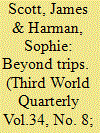

|
|
|
|
|
| Publication |
2013.
|
| Summary/Abstract |
The current round of World Trade Organization (WTO) negotiations-the Doha Round-has significant implications for global health which have received insufficient attention from the global health community. All too often the health implications of global trade agreements are examined only after their conclusion, and are concerned only with intellectual property rights. This paper seeks to move beyond this narrow focus and elucidate the wider health implications of the Doha Round. It explores the negative effect of the Round on state capacity to provide and regulate health services in low-income countries, and the impact it will have on livelihoods among the poor and their ability to access health services. Overall the paper makes the case for greater engagement from the health community with the wto and the Doha Round negotiations beyond the customary focus on intellectual property rights.
|
|
|
|
|
|
|
|
|
|
|
|
|
|
|
|
| 2 |
ID:
150581
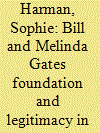

|
|
|
|
|
| Summary/Abstract |
The Bill and Melinda Gates Foundation brings to light the legitimacy problem with global philanthropy. The legitimacy problem here is twofold: first, with regard to the criteria used to assess the presence or absence of legitimacy in global governance; and, second, how analysis of legitimacy does not fully account for how we understand the legitimate basis of rule drawn from private wealth. This article begins to address this lacuna by analyzing the legitimacy of an actor that wields considerable authority in the field of global health politics and has growing prominence in contemporary global governance, the Bill and Melinda Gates Foundation.
|
|
|
|
|
|
|
|
|
|
|
|
|
|
|
|
| 3 |
ID:
144249
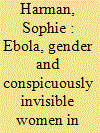

|
|
|
|
|
| Summary/Abstract |
The international response to Ebola brings into stark contention the conspicuous invisibility of women and gender in global health governance. Developing feminist research on gender blindness, care and male bias, this article uses Ebola as a case to explore how global health rests on the conspicuous free labour of women in formal and informal care roles, yet renders women invisible in policy and practice. The article does so by demonstrating the conspicuous invisibility of women and gender in narratives on Ebola, emergency and long-term strategies to contain the disease, and in the health system strengthening plans of the World Health Organization and World Bank.
|
|
|
|
|
|
|
|
|
|
|
|
|
|
|
|
| 4 |
ID:
147822
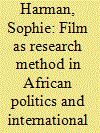

|
|
|
|
|
| Summary/Abstract |
This research note reflects on the use of film as a method in researching politics and international relations in African countries. It is based on the experiences of producing a feature-length drama about the everyday risk of HIV/AIDS, using real people and their stories in Tanzania. The intent of the film, Pili, is to challenge international aesthetics of HIV/AIDS in film and how people understand the complexities and structural politics of disease. It is argued that the film itself is not the only outcome or contribution to knowledge. The external narrative or process of how the film was made, the method of doing, also produces new ways of thinking about ethics, collaboration, and navigating the state in conducting research. The research note makes this argument by first reflecting on the origins and debates of visual method, and then exploring what film as a research method reveals about structure and agency, research collaboration, ethics, and the state.
|
|
|
|
|
|
|
|
|
|
|
|
|
|
|
|
| 5 |
ID:
119439
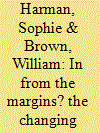

|
|
|
|
|
| Publication |
2013.
|
| Summary/Abstract |
This article surveys recent literature on Africa and International Relations (IR) and reviews the current place of Africa within the discipline. It notes that critical debates continue around claims of a mismatch between Africa and 'mainstream' IR theories and concepts.
However, alongside this set of issues, there is in fact a burgeoning literature on many aspects of Africa's international relations. While some of these studies utilize existing IR theories, and others explore empirical cases that could deliver important lessons for the wider discipline, much of this promise goes unfulfilled.
The article reviews literature on China's role and on HIV/AIDS governance in Africa to illustrate how the study of African international relations, the wider IR discipline and international policy could all benefit from a closer engagement between Africa and IR. The article concludes by setting out three challenges for a renewed agenda: a need to address the problematic relationship between universal analytical concepts and regional particularities; a need to give recognition to, and analyse, African agency in international politics; and a need to address inequalities in knowledge production in the field of Africa's international relations.
|
|
|
|
|
|
|
|
|
|
|
|
|
|
|
|
| 6 |
ID:
133291
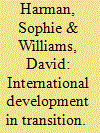

|
|
|
|
|
| Publication |
2014.
|
| Summary/Abstract |
International development is in a period of transition. While the outcome of this is still unclear, this article argues that there are at least four areas in which the project of international development is changing. First, there is a debate, especially within the World Bank, about development strategy and how we think about development, particularly in terms of the balance between states and markets. This is evident in the debate over state failure and the new structural economics. Second, there is increasing evidence of a shift in lending, away from projects of 'small' human development, perhaps best encapsulated by the United Nations Millennium Development Goals, towards more transformative 'big' development projects such as infrastructure. Third, 'non-traditional' aid donors and new forms of private philanthropy are playing a more significant role in development financing and this, in turn, offers developing countries a new range of choices about what kinds of development assistance they receive. Fourth, aid relations are changing as a result of the renewed agency of developing states, particularly in sub-Saharan Africa, and shifts towards increased South-South cooperation are growing as evidenced by increased funding from regional development banks and increased trade flows. The article reviews these changes and suggests a series of questions and challenges that arise from them for analysts of international development, developing countries and traditional aid donors.
|
|
|
|
|
|
|
|
|
|
|
|
|
|
|
|
| 7 |
ID:
164989


|
|
|
|
|
| Summary/Abstract |
The United States presidential election of Donald Trump in 2016 was observed by global health commentators as posing dire consequences for the progress made in global health outcomes, governance, and financing. This article shares these concerns, however, we present a more nuanced picture of the global health governance progress narrative pre-Trump. We argue that Trump’s presidency is a displacement activity to which global health’s pre-existing inequalities and problems of global health security, financing, and reproductive health can be attributed. Unfettered access to sexual and reproductive rights, sustained financing of health system strengthening initiatives, affordable medicines and vaccines, and a human security-centred definition of global health security were already problematic shortfalls for global health governance. Trump no doubt exacerbates these concerns, however, to blame his presidency for failings in these areas ignores the issues that have been endemic to global health governance prior to his presidency. Instead of using Trump as a displacement activity, his presidency could be an opportunity to confront dependency on US financing model, the lack of a human-security centred definition of global health security, and the norm of restricting reproductive health. It is such engagement and confrontation with these issues that could see Trump’s presidency as being a catalyst for change rather than displacement as a means of preserving the uncomfortable status quo in global health. We make this argument by focusing on three specific areas of US-led global health governance: reproductive health and the ‘global gag rule’, health financing and the President’s Emergency Plan for AIDS Relief (PEPFAR), and pandemic preparedness and global health security.
|
|
|
|
|
|
|
|
|
|
|
|
|
|
|
|
| 8 |
ID:
108959


|
|
|
|
|
| Publication |
2011.
|
| Summary/Abstract |
Leadership is one of the central explanatory factors for change within international organizations yet is often sidelined as a part of wider social processes or understood in the context of domestic and managerial political agency. This article adopts one of the few understandings of leadership within international organization-Robert Cox's 1969 essay on the executive head-as an analytical model for understanding leadership within global HIV/AIDS governance. It does so by applying Cox's framework of analyzing the role of the executive head in relation to the international bureaucracy, member states, and the international system to the position of the former executive director of the Joint United Nations Programme on HIV/AIDS (UNAIDS), Peter Piot. The article argues that the role of leadership transcends the agency of simply opening up the black box of international organizations and is a realm of political knowledge and agenda-setting that is integral to the formation and subsequent longevity of international institutions, alliances, and the global issues that justify their existence.
|
|
|
|
|
|
|
|
|
|
|
|
|
|
|
|
| 9 |
ID:
178078
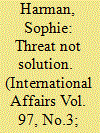

|
|
|
|
|
| Summary/Abstract |
COVID-19 has led to long overdue visibility of the gendered determinants and impacts of health emergencies and global health security. This article explores why gender was neglected in previous health emergencies, what led to change in visibility of gender issues during the first six months of the COVID-19 pandemic, and the implications of such change for understanding the relationship between gender and global health security. The article explores the question of neglect by drawing on original research into the 2014–16 Ebola outbreak in Sierra Leone, its aftermath and implications for future pandemic preparedness. The article then looks in detail at the research efforts, funding, epistemic community activism and impact of COVID-19 to explain why gender received high profile political attention and acknowledgment. The article argues that the change in visibility, research and advocacy around gender equality during the COVID-19 outbreak does not demonstrate an advancement in gender equality in global health. To the contrary, such visibility reinforces the inherent problems of global health security evident in the 2014–16 Ebola outbreak that create and reproduce binaries of neglect and visibility, and hierarchies of the global health issues that matter, the people that matter and the women that matter. What unites neglect and visibility of gender in global health security is that gender is understood as solution rather than threat. Combined these factors make gender equality incompatible with global health security.
|
|
|
|
|
|
|
|
|
|
|
|
|
|
|
|
| 10 |
ID:
187526


|
|
|
|
|
| Summary/Abstract |
Operative paragraph 7 of UN Security Council (UNSC) Resolution 2532 (2020) acknowledges ‘the critical role that women are playing in the COVID-19 response efforts’, the ‘disproportionate negative impact the pandemic is having on women and girls’, and ‘calls for concrete actions to minimise this impact and ensure the full, equal and meaningful participation of women and youth in the development and implementation of an adequate and sustainable response to the pandemic’. This Resolution is clear in its language: states must recognise and respond to the gendered effects of the pandemic. The adoption of Resolution 2532 and subsequently 2565 (2021) is an important opportunity to further integrate health emergencies and UNSC’s Women, Peace, and Security (WPS) agenda. The language is deliberate: it offers global health a set of mechanisms on how to integrate gender into complex crises and, in turn, offers WPS a chance to engage with health and pandemics as a security challenge for women and girls. However, as previous health emergencies and the WPS agenda show us, Resolutions are not a panacea: they are political compromises often riddled with contradictions and are dependent on states and the international community to implement them.
|
|
|
|
|
|
|
|
|
|
|
|
|
|
|
|
|
|
|
|
|